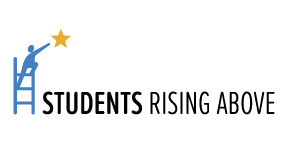My Best College Class: Topics in Neuroethics
- Posted by Students Rising Above
- Categories Blog
- Date August 22, 2012
I know what you must be thinking: of all the fun classes to take in college, how did a class called Topics in Neuroethics make the top of my list? My answer is that it combined all of the best elements of a class you will ever get to experience in college.
It was seminar class of about twenty people, all psychology and neuroscience majors. I was confident that it would be a great class because I knew the professor. Professor McCaskill had taught another class I had taken the previous semester, and I loved her lectures because she was engaging, funny, interested in her students’ opinion, and always posed thoughtful questions. Her sensitivity to the real experiences of people suffering from mental illness made her compassionate, and she frequently encouraged us to imagine ourselves in the shoes of the mentally ill, bridging the gap between ourselves and the people we studied. This is the first component of a great college class: a professor who is knowledgeable and dynamic.
At first, however, I was concerned that the subject of this new class was a little obscure (how many topics in neuroethics can there be?), but I came to discover that neuroethics is a small but very important field of study for psychologists and neuroscientists. How do we treat the human element? Who do we take advantage of when we conduct studies that seriously impact people’s lives? Are the advances we are making in changing the basic chemistry of the human brain right for society? What are the moral implications of the work we do and how will it change the way people live and think? These were the question swimming in my brain as we talked about practices like neurotransplantation, brain death, and cognitive enhancement. It put me in a position of great moral responsibility that was never touched upon in other classes. I was shocked to discover the passion of my own beliefs that I never knew existed, and I was equally surprised to learn how the beliefs of my peers differed from mine. This is the second component of a great class: interesting, meaningful material that challenges the way you perceive the world around you.
The best part of the experience, however, was the fact that the class was a seminar. Our professor encouraged us to speak from our private, sometimes painful experiences with the topics we discussed. We were free to share aspects of ourselves that are often left out of class discussions because they are deemed too personal, uncomfortable, or politically incorrect: our religious beliefs, our traumatizing experiences, our families, our prejudices. I got to know my classmates with a level of intimacy that I had never experienced even with friends I had known for years. We grew to understand the sources of our differing views, to empathize, and to disagree passionately yet respectfully. Not a few tears were shed that semester as we were entrenched in the gravity of these moral discussions, these questions of life, death, humanity, and suffering. This was by far the best and rarest quality of a great college class: this was my opportunity to be completely open to my peers and to have them be open to me. It was my chance to not only learn what they thought, but what they felt in their deepest and most private selves in a space that was safe, supportive, and inspiring.
When you start taking classes in college, don’t be afraid to reach high. Take those graduate seminars with those great professors. Speak up and represent yourself in discussion. Listen to and grow from the experiences of others. Let yourself be changed by what you learn in class. You may find depths of yourself that you never knew were there before and discover heights of your potential that you never dreamed were possible.
You may also like
-
Students Rising Above Welcomes Eli Kennedy as New CEO
10 March, 2025We’re thrilled to welcome Eli Kennedy as our new CEO! For over 25 years, Students Rising Above (SRA) has been a stabilizing force for first-generation college students, providing holistic support, mentorship, and opportunities needed to navigate college and launch careers. …
-
Written By Wendy Tokuda, Award-Winning Journalist and Founder of SRA One person can make all the difference in the world. For three Students Rising Above students, that person was Jim Wallace. He was a humble, gentle man, who never wanted …
-
CONTACT NAME: Meredith Curry Nuñez DATE: June 28, 2024 CONTACT ORG: Northern California College Promise Coalition CONTACT NUMBER: (408) 901-0290 CONTACT EMAIL: [email protected] Richmond, CA – The Northern California College Promise Coalition (NCCPC), in collaboration with founding Steering Committee members …
